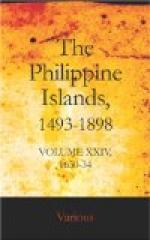Tabora, who named it “La Magdalena” for
his wife. It was always said that the ship had
no strength and ought not to make the trip. The
people said this among themselves; but, when they spoke
of it to the governor, they praised it, and said that
it was the best vessel in the world, for the contrary
grieved him greatly. It was laden, and then its
weakness was evident, so that they had to change their
tune to that very governor. It was said that
it would be made all right by putting in some stiffening—namely,
three planks on each side, very thick and heavy—whereby
it seemed that the vessel would be strengthened.
Accordingly, the people embarked, a thing that ought
not to have been done. On Thursday, at dawn,
we were about to set sail; and when they weighed the
anchor that held the ship, it listed to starboard
so rapidly that, had not the point of the largest yard
caught on the shore, the ship would doubtless have
turned keel up. To see so many men perish there
and so much property lost, was a day of judgment—an
event such as no one remembers to have heard told before.
The artillery was fired at intervals from the fort
of Cavite, whereat the governor and many vessels came
up. I was the first to escape from the ship,
but as by a miracle; for I jumped into the water from
the lantern, clothed as I was with my black habit.
By God’s help I was enabled to reach a small
boat, in which I escaped, as above described.
May the Lord’s will be fulfilled. With
this I have been in danger of death seven times from
the water while in the islands, whence the Lord by
His mercy has miraculously drawn and freed me.
The first was shortly after my arrival in the country,
at Aclan. While bathing in the river, suddenly
a current came whose rapidity seized me and bore me
beyond my depth. I was already lost and surrendered
myself to the mercy of the water, for I could not
swim. God inspired a sacristan who was there,
who dived quickly into the water, followed me, and,
catching hold of me, drew me ashore. The second
was while prior of Ibahay, and when I was visiting
the islands. While crossing to one, so fierce
a storm struck me that the Indians gave up hope, and
thought only of dying. The little boat was a
poor one, without helm or sail. All human aid
being exhausted, I had recourse to the [departed]
souls, who obtained a change of wind from the Lord;
thus, with a powerful north wind, and the anchor thrown
astern from a cable to aid as a rudder, we reached
a little islet at two o’clock at night.
There we moored, that stormy night. As soon as
we reached the islet, the vendaval began to blow again,
so that it would seem that the north wind had blown
only for that. The third was in the same river
of Ibahay. While ascending it when it had a very
large strong current (for it is a furious river),
it overturned my little boat, and drew me under; but,
although I did not know how to swim, the water was
drawn from under me, and I remained on the surface
of the water, in such manner that I did not sink beyond




